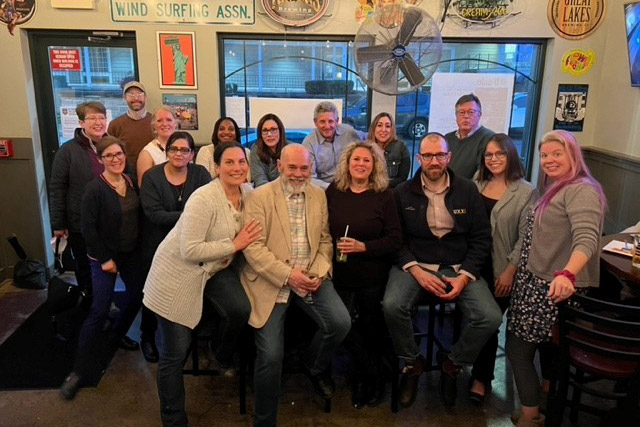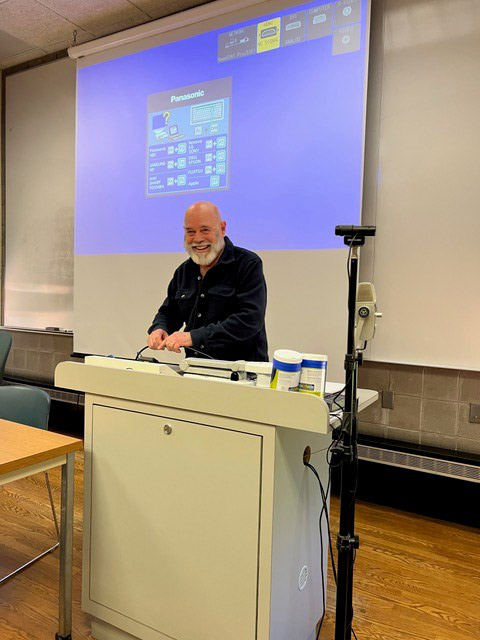Professor Rudy Pugliese retires and will become professor emeritus
Pugliese, professor in RIT’s School of Communication, retires in June after nearly 40 years of teaching
Provided photo
Rudy Pugliese (first row, second from left) and his colleagues in the School of Communication gathered to celebrate his retirement.
Professor Rudy Pugliese will adopt the title of professor emeritus on July 1 when he officially retires. Pugliese taught in the College of Liberal Arts’ School of Communication for 37 years. In addition to his teaching responsibilities, he also spent 24 years advising students working for Reporter Magazine. The connections he formed with his students and fellow faculty and staff in his department are the memories Pugliese says he will cherish most.
Charlotte Deering
This photo of Pugliese was taken during the last class he taught at RIT. It was taken by his mentee and “the daughter he never had,” Charlotte Deering, who defended her dissertation for a doctorate in media analytics and communication psychology from the University of Oregon in May 2023.
Pugliese began his time at RIT in 1979 when he accepted a three-year lecturer contract. He shared that because the people were so welcoming, he went on to earn a doctorate so he could come back as a full-time faculty member. He rejoined the RIT faculty roster in 1989 and, since then, has helped shape the School of Communication into what it is today.
Pugliese helped create the school’s communication and media technologies graduate program (renamed to communication graduate program) and served as its director from 2001 to 2015. He also played a significant role in the development of the advertising and public relations undergraduate degree program.
During retirement, Pugliese shared that he plans to travel and hopes to visit England, Italy, and the Alhambra in Spain. He also plans to revisit The Queen Mary in Long Beach, Calif., because of his familial connections to the ship. In his words, “it took my father to war and returned him safely, brought my mother to New York to marry him, and brought me back from England at the age of 5.”
Below are some reflections Pugliese shared about his time at RIT.
What are you most proud of when looking back at your time at RIT?
The creation and success of two degree programs: the bachelor’s degree in advertising and public relations and the master’s degree in communication and media technologies. Around a dozen of our graduates went on to earn Ph.D.s at other universities, and I have mentored a number of them. One just defended her dissertation and will graduate in June.
I’d also say working with students on Reporter was a highlight. They have won too many awards to list, including two Pacemakers, often considered the Pulitzer of the college press. The connections I made with those students, as well as with those I had in class, also provided another highlight for me: weddings. A number of my students met their wives or husbands at RIT and my wife and I were invited to attend their weddings.
What are some of your favorite memories from working with students on Reporter Magazine?
The “good trouble” the students got into. I think that the funniest and wittiest issues of Reporter were the ones that produced the most reactions. I remember I worked closely with Alyssa Jackson Pressler for two years and, during that time, we tried to distribute the gender identity issue of Reporter at the Imagine RIT festival. We were met with opposition, but we worked out a compromise with then President Destler and I think it was one of the best issues Reporter printed—and all of this was before pronouns on our email became the norm.
Ultimately, I think the thing I liked most was when students came to me for advice. I don’t give unsolicited advice because I know they won’t take it. But if they come to me and ask, not only are they going to listen, but they might do as I suggest or maybe make the ideas a little better. For example, one year they were running a story on Valentine's Day and one of the staff members posed naked for the cover with her boyfriend. The editors-in-chief at the time said they couldn’t run it because the administration would really go crazy, but they had no other cover planned. The paper was coming out weekly on Fridays back then, so it had to go to the printer on Sunday night before everyone went to bed. When they came to me, I suggested they crop the image, and they ended up cropping it in such a way that nobody could tell what it was unless you were ‘in the know.’ It was a creative solution that seemed obvious to me, but sometimes you need an outsider’s perspective to tell you what you haven’t thought about it or what you’re not seeing.
Do you have any advice or words of wisdom for current and future faculty?
Make yourself indispensable. Administration and staff can’t alone run the university, so don’t shy away from working on important committees like tenure and promotion. Hard work has a way of bringing people together, and an occasional meeting at MacGregor’s can do wonders for morale. Publications may get you tenure, but friends and colleagues provide the reasons for staying—or in my case coming back.















